 Website:
Trelleborg Marine and Infrastructure
Website:
Trelleborg Marine and Infrastructure
Group: Trelleborg
Catalog excerpts

Guide to fenders Trelleborg Marine Systems | Takes the pressure off
Open the catalog to page 1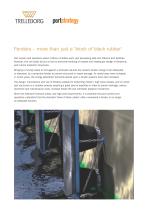
Fenders – more than just a ‘block of black rubber’ Port owners and operators spend millions of dollars each year developing safe and efficient port facilities. However, this can easily be put at risk by abnormal berthing of vessels and inadequate design of fendering and marine protection structures. Bringing a moving vessel to rest against a dockside requires the vessel’s kinetic energy to be dissipated, or absorbed, by a protective fender to prevent structural or vessel damage. As vessel sizes have increased in recent years, the energy absorption demands placed upon a fender systems have...
Open the catalog to page 3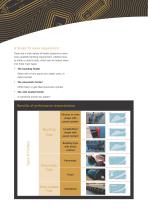
A fender for every requirement There are a wide variety of fender systems to meet every possible berthing requirement, whether shipto-shore or ship-to-ship, which can be broken down into three main types: • The buckling fender Either with a front panel and rubber cone, or direct contact • The pneumatic fender Either foam or gas filled pneumatic cylinder • The side loaded fender A cylindrical torsion bar system Benefits of performance characteristics Circular or cone shape with panel contact Buckling Type Types of Fenders Longitudinal shape with panel contact Buckling type with direct...
Open the catalog to page 4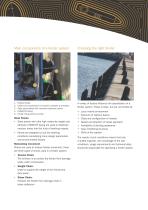
Main components of a fender system Choosing the right fender Rubber fender Chains and accessories (U-anchors, brackets & shackles) Steel panel paited with corrosion protection paints UHMW PE facing Fender fixing anchors & bolts Steel Panels • teel panels with ultra high molecular weight poly S ethylene UHMW-PE facing are used to distribute reaction forces into the hulls of berthing vessels. • anels are designed to suit the berthing P conditions considering many design parameters and environmental factors. Restraining movement Chains are used to restrain fender movement; there are three...
Open the catalog to page 5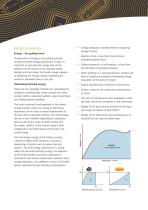
Design procedures Energy – the guiding force Conservation of energy is the guiding principle for general fender design procedures. Firstly, it’s important to calculate the energy that will be delivered by the impact of the heaviest vessel berthed and then select the fender design capable of absorbing the energy, without exceeding the maximum allowable force on the pier. • nergy absorption exceeds effective impacting E energy of ships • eaction force is less than the structures R allowable reaction force • urface pressure, or hull pressure, is less than S the allowable hull surface pressure...
Open the catalog to page 6
Advanced fenders require advanced manufacturing Not just a ‘block of black rubber’ The increased demands placed on contemporary fender systems requires a highly-considered design with the highest quality materials and bespoke rubber compounds, using the most innovative manufacturing processes. The load/ deflection characteristics commonly known as the performance of the fender is very much dependent on the manufacturing process. The fender manufacturing process involves: • • • Vertical Compression Carried out at various speeds and temperatures Compound formulation and mixing of rubber...
Open the catalog to page 7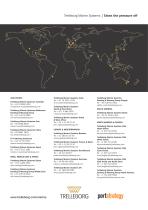
Trelleborg Marine Systems | Takes the pressure off ASIA PACIFIC Trelleborg Marine Systems Australia Tel: +61 2 9285 0200 constantine.koutas@trelleborg.com Trelleborg Marine Systems Melbourne Docking & Mooring Group Tel: +61 3 9575 9999 anil.kumar@trelleborg.com Trelleborg Marine Systems Asia Tel: +65 6268 8005 steven.kwok@trelleborg.com Trelleborg Marine Systems China Tel: +65 6867 2855 ron.lee@trelleborg.com PT Trelleborg Indonesia Tel: +62 21 797 6211 steven.kwok@trelleborg.com Trelleborg Marine Systems Japan Tel: +81 3 3512 1981 hiroshi.muramoto@trelleborg.com INDIA, MIDDLE EAST & AFRICA...
Open the catalog to page 8All Trelleborg Marine and Infrastructure catalogs and brochures
-
SafePilot brochure
20 Pages
-
Docking & Mooring
88 Pages
-
Pneumatic Fender infographic
1 Pages
-
Pneumatic Fenders brochure
28 Pages
-
Fender Application Design Manual
88 Pages
-
Multipurpose and Tug Fenders
44 Pages
-
Rolling Fenders and Safety
18 Pages
-
AutoMoor Brochure
24 Pages
-
Fender Systems
86 Pages
-
DynaMoor
20 Pages
-
Bollards
28 Pages
-
Solid SmartFender Factsheet
2 Pages
-
Ship-Shore Links Factsheet
4 Pages
-
SmartDAS Factsheet
2 Pages
-
TRELLEBORG DYNAMOOR
4 Pages
-
SmartDock ® Display Board
4 Pages
-
Surface Buoyancy
24 Pages
-
SmartMoor Series II
7 Pages
-
Performance Monitoring
3 Pages
-
Universal Safety Link
3 Pages
-
TRELLEBORG’S Tugger Winch
2 Pages
-
LNG Infographic
8 Pages
-
SafePilot User Guide
30 Pages
-
Safepilot SmartPort System
16 Pages
-
Combined ESDS & SSL
3 Pages
-
Ship Shore Link System
3 Pages
-
Emergency Shutdown Link
3 Pages
-
Floating Fenders
48 Pages
-
Prelude LNG
1 Pages
-
AutoMoor Datasheet
4 Pages
-
SafePilot CAT XT System
2 Pages
-
Whitepaper - Correction Factors
10 Pages
-
Mini Guide - Foam Fenders
5 Pages
-
Buoy Range Table
2 Pages
-
Hawser Hooks
6 Pages
-
Barometer Report 3
16 Pages
-
Barometer Report 2
7 Pages
-
lload monitoring software
2 Pages
-
lload monitoring systeme
5 Pages
-
Remote Release System
6 Pages
-
Capstans
4 Pages
-
Accessories
10 Pages
Archived catalogs
-
Docking and mooring
2 Pages






















































































